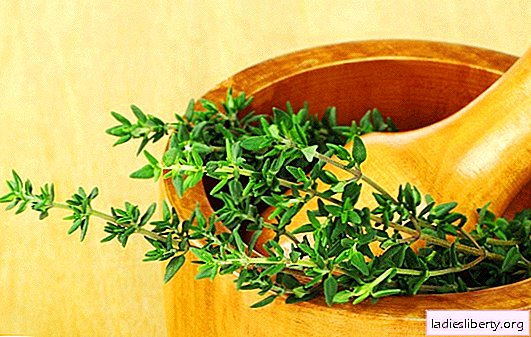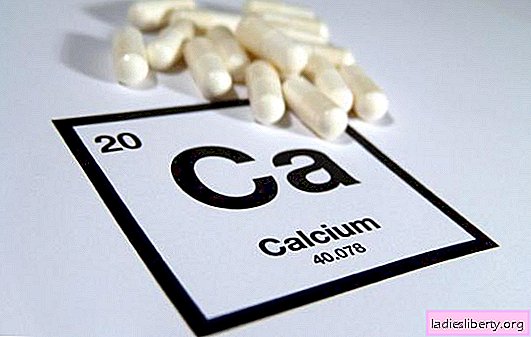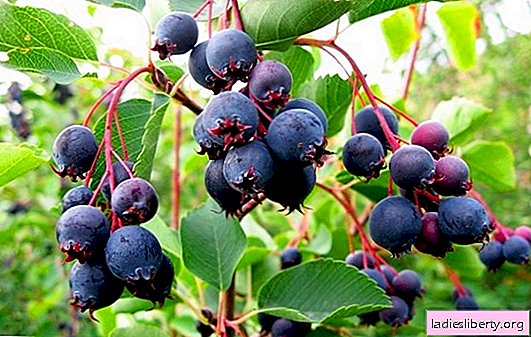
Common thyme (Thymus vulgaris) - a dwarf shrub from the family Lamiaceae (Lamiaceae), which has gray-green leaves and small purple flowers. For pharmacological purposes, leaves and flowers are collected. Essential oil is obtained from them, which is used in herbal medicine. To obtain oil, steam distillation is used.
Thyme oil is a reddish-brown liquid with an intense odor and pungent taste.
For the production of oil, fresh above-ground plant parts of various thyme are used.
Thyme oil is a mixture of various substances, the composition of which varies greatly depending on the chemotype of the plants. Chemotype - varieties of plants that contain a greater amount of certain chemicals. The content of chemicals in thyme oil is crucial for its use as a medicinal plant.
The composition of essential oils, depending on the thyme chemotype:
- Geraniol chemotype contains up to 90% of geraniol and geraniol acetate.
- Linalool chemotype consists of 95% linalool, with a small fraction of linalyl acetate, which is rarely up to 30%.
- The chemotype α-terpineol contains up to 96% α-terpineol. Here the ratio of ether to alcohol is always 2: 1.
- The chemotype trans-tuyanol-4-terpineol-4 consists of up to 56% of tuanol.
- Carvacrol chemotype contains up to 85% carvacrol, only about 0.5% is thymol.
- Thymol chemotype in the summer contains up to 65% of thymol and a proportion of 5 to 10% carvacrol.
Other important components are p-cimen, 20 different flavones, tannins, triterpenes, phenolic acids and biphenyls. The effectiveness of thyme has been proven in some laboratory tests.
The healing properties of thyme have not been conclusively proven in any study. However, laboratory experiments show that thymol is one of the most powerful antibacterial and antiviral components of essential oils. Thyme also has an analgesic effect in studies on human cell cultures.
Pain and inflammation
Doctor's comment: thymol has an analgesic effect, as has been shown in laboratory tests and clinical studies. The anti-inflammatory and antispasmodic properties of thymol are believed to contribute to pain relief. This effectiveness should be further substantiated in the future.
It is also said that polymethoxy flavones and monoterpenes from thyme have antispasmodic and antitussive effects. In traditional medicine, thyme is used to eliminate coughs, colds, bronchitis and inflammation of the upper respiratory tract. The plant is effective in this indication, but should be used with caution.
Gastrointestinal Disorders
Doctor's comment: thyme's main indication is gastrointestinal dysfunction. Thyme also reduces the symptoms of functional disorders of the stomach and intestines. Traditional folk medicine believes that thymol can stimulate the release of saliva and gastric juice, therefore, thyme is recommended for the treatment of loss of appetite. Clinical efficacy with this indication has not been proven.
Bacterial diseases
Doctor's comment: both thyme oil and thymol are antibiotics. Thymol is one of the most powerful antibacterial and antiviral components of essential oils. Under certain experimental conditions, the growth of fungi and fungal toxins also slows down. Therefore, thyme is suitable for the treatment of inflammation of the mucous membrane of the oral cavity and pharynx, as well as bad breath.
Depending on the origin of thyme, the oil is a colorless, yellowish, sometimes reddish, oily liquid. Relative density varies from 0.895 to 0.937. In water, the oil is practically insoluble, but it is well soluble by many organic solvents - ethanol, ether or chloroform. The smell is strong spicy-phenolic, the taste is pungent.
Thyme is used against catarrh of the upper respiratory tract, bronchitis and whooping cough. All other applications, for example, against infections of the throat, intestines and urinary tract, rheumatism, disinfection of wounds, and the prevention of infectious diseases were considered unreasonable.
In aromatherapy, the plant is used against such symptoms, as well as for the prevention of infectious diseases. However, as with all aromatherapy methods, there is no evidence of effectiveness. It is used in perfumes and for aromatization of food products, as well as for oral care.
Anxiety
Doctor's comment: the anti-anxiety effect was revealed in studies on animals, mainly rats. According to experiments, thyme oil reduces anxiety and depression by binding to GABA receptors. Research on the relaxing effects of thyme is still underway. Final conclusions cannot be drawn, but there is evidence that the effect is higher than placebo.
Other indications
Doctor's comment: creeping thyme has antipyretic, digestive effects and helps against parasitic diseases in the intestines. According to folk medicine, thyme enhances overall blood circulation. Another of the healing properties is that it is an effective natural expectorant that helps cleanse the respiratory tract.
According to some scientific evidence, thyme prevent the spread of mushrooms in pools and public showers. Thyme is very rarely used in ointments to soothe tension headaches. Analgesic properties in rheumatism, gout, lumbago or sciatica have not been identified in any clinical study.
An absolute contraindication to thyme is an allergy to the plant. Thyme very rarely causes allergic reactions. People who are allergic to pollen from birch and celery may also be sensitive to thyme. With large skin lesions, acute skin diseases, severe febrile and infectious diseases, heart failure and hypertension, it is forbidden to use thyme.
For safety reasons, thyme preparations should not be taken during pregnancy and lactation. Excessive consumption can cause thyrotoxicosis, therefore use in the form of tea is not recommended in the long term. It works best in the form of ointments, baths (for the regeneration of skin cells) and as a spice for various dishes (to improve digestion, bloating).
External use of thyme
Doctor's comment: for external use, thyme is often mixed with other herbal products - the extract of medicinal sage or St. John's wort perforated. Essential oil is used as bath additives for bronchial catarrh and itching of the skin.
Wrap
Doctor's comment: for bronchitis, thyme oil wraps may be recommended. To do this, dissolve 10% of thyme with sunflower or almond oil and heat it to body temperature in a water bath. Apply to the tissue and wrap the affected area of the body with it. An allergy to a medicinal plant should be excluded, especially in children. A chest wrap can be worn all night.
Other uses
Doctor's comment: 1-2 g of the drug put in a cup and pour hot water. Drink several times a day to reduce constipation. Thyme can improve digestive functions before and during meals. To rinse the oral cavity, it is recommended to use a 5% solution. Tincture of the plant (from 70% alcohol) must be taken 40 drops three times a day.
Thyme has minor therapeutic effects, but can be used as a spice. Long-term use in the form of tincture or ointment should be discussed with your doctor in order to avoid side effects.











